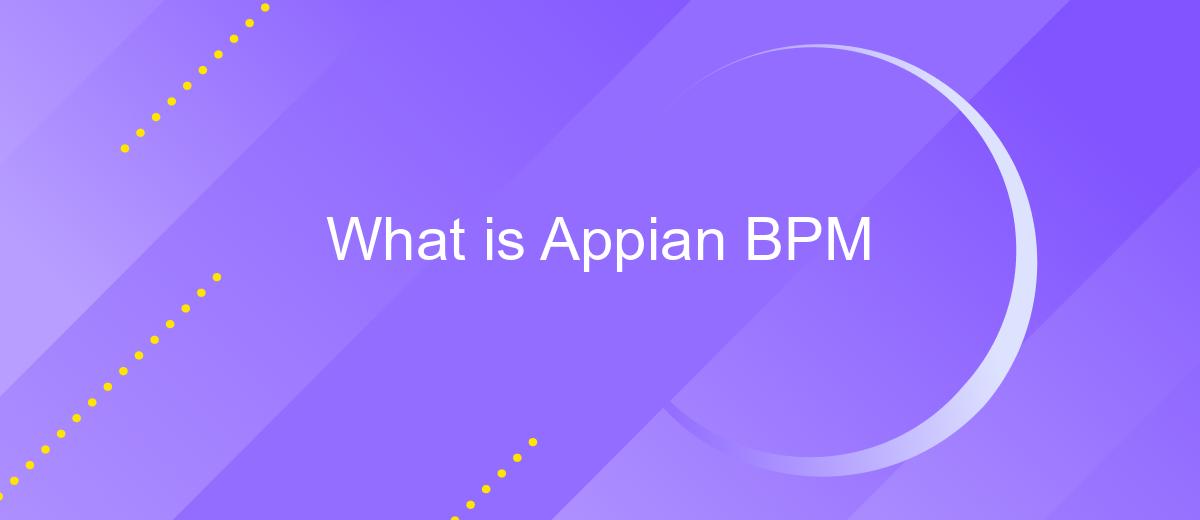What is Appian BPM
Appian BPM (Business Process Management) is a comprehensive platform designed to streamline and automate complex business processes. By integrating powerful workflow automation, data management, and analytics, Appian BPM helps organizations enhance efficiency, reduce operational costs, and improve overall performance. This article delves into the key features, benefits, and applications of Appian BPM, showcasing how it transforms business operations in various industries.
Introduction
Appian BPM (Business Process Management) is a comprehensive platform designed to streamline and optimize business processes. It provides a robust environment for automating workflows, enhancing collaboration, and improving overall efficiency. With its low-code development approach, Appian enables organizations to design, execute, manage, and optimize complex business processes with minimal coding effort.
- Automated Workflow Management
- Low-Code Development
- Enhanced Collaboration Tools
- Real-Time Analytics and Reporting
- Seamless Integration Capabilities
One of the standout features of Appian BPM is its ability to integrate seamlessly with other systems and services. Tools like ApiX-Drive facilitate these integrations, allowing businesses to connect Appian with a wide range of applications effortlessly. This ensures that data flows smoothly across different platforms, enhancing operational efficiency and providing a unified view of business processes.
Definition and Key Features

Appian BPM (Business Process Management) is a comprehensive platform designed to streamline and automate business processes. It provides a unified environment where users can design, execute, manage, and optimize processes with ease. The platform supports a low-code development approach, allowing even non-technical users to create sophisticated workflows and applications rapidly. This results in increased efficiency, reduced errors, and a more agile business operation.
Key features of Appian BPM include process modeling, case management, and robust analytics. The platform also offers seamless integration capabilities, enabling businesses to connect with various external systems and services. For instance, using tools like ApiX-Drive, organizations can effortlessly integrate Appian with other applications, ensuring smooth data flow and enhanced functionality. Additionally, Appian provides real-time monitoring and reporting, empowering businesses to make data-driven decisions and continuously improve their processes.
Architecture and Components

Appian BPM (Business Process Management) is a comprehensive platform designed to streamline and optimize business processes. Its architecture is built on a robust and scalable foundation that ensures high performance and reliability. The platform comprises several key components that work in harmony to provide a seamless user experience and efficient process management.
- Process Modeler: A visual design tool that allows users to create and manage business processes using a drag-and-drop interface.
- Business Rules Engine: Facilitates the creation and management of business rules to automate decision-making within processes.
- Integration Services: Enables seamless integration with external systems and applications, including the use of services like ApiX-Drive to automate and streamline data exchange.
- Analytics and Reporting: Provides real-time insights and analytics to monitor process performance and identify areas for improvement.
- Collaboration Tools: Enhances team collaboration through features like task assignments, notifications, and document sharing.
These components collectively ensure that Appian BPM can effectively manage complex business processes, improve operational efficiency, and support continuous improvement initiatives. By leveraging integration services like ApiX-Drive, organizations can further enhance their workflows and achieve greater automation and data synchronization across various systems.
Benefits and Use Cases

Appian BPM offers numerous benefits, making it a valuable tool for businesses seeking to streamline their processes. One of the primary advantages is its ability to enhance operational efficiency by automating repetitive tasks. This not only reduces the margin for human error but also frees up valuable employee time for more strategic activities.
Another significant benefit is its flexibility and scalability. Appian BPM can be tailored to meet the specific needs of different industries, whether it's healthcare, finance, or manufacturing. Moreover, as businesses grow, the platform can easily scale to accommodate increased workloads and more complex processes.
- Automated workflow management
- Real-time process monitoring
- Seamless integration with existing systems
- Enhanced compliance and reporting
- Improved customer experience
In terms of use cases, Appian BPM is particularly effective in environments where integration with various systems is crucial. For instance, using services like ApiX-Drive, businesses can effortlessly connect Appian BPM with other applications, ensuring smooth data flow and enhancing overall process efficiency. This makes it an ideal solution for organizations looking to optimize their digital transformation journey.
Conclusion
In conclusion, Appian BPM stands out as a comprehensive and robust solution for businesses seeking to streamline their processes and enhance operational efficiency. Its user-friendly interface and powerful capabilities enable organizations to design, execute, monitor, and optimize their business processes with ease. By leveraging Appian BPM, companies can achieve greater agility, improved compliance, and better decision-making through real-time insights and analytics.
Moreover, the integration capabilities of Appian BPM are noteworthy. Tools like ApiX-Drive can further enhance these integrations, allowing seamless connectivity with various applications and services. This ensures that businesses can automate workflows and synchronize data across multiple platforms without the need for extensive coding. Ultimately, Appian BPM, coupled with integration services like ApiX-Drive, empowers organizations to drive innovation, reduce operational costs, and stay competitive in an ever-evolving market landscape.
- Automate the work of an online store or landing
- Empower through integration
- Don't spend money on programmers and integrators
- Save time by automating routine tasks
FAQ
What is Appian BPM?
How does Appian BPM improve business processes?
Can Appian BPM integrate with other systems?
Is Appian BPM suitable for all types of businesses?
What are some common use cases for Appian BPM?
Do you want to achieve your goals in business, career and life faster and better? Do it with ApiX-Drive – a tool that will remove a significant part of the routine from workflows and free up additional time to achieve your goals. Test the capabilities of Apix-Drive for free – see for yourself the effectiveness of the tool.


